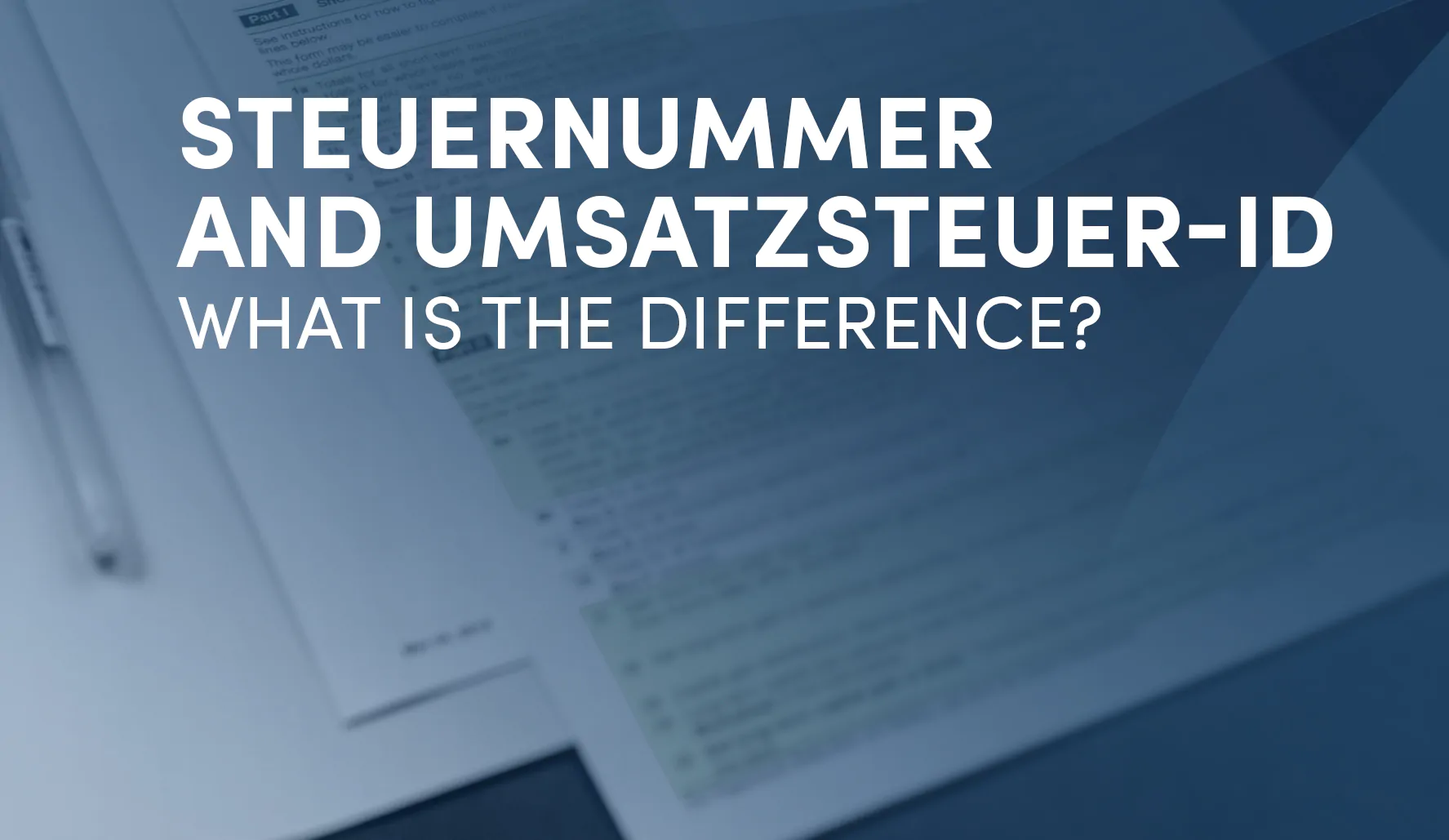ClevverBlog








16th Mar 2021
Germany uses many different tax identification numbers. For an entrepreneur who writes an invoice for the first time, it can be difficult to distinguish them. They are faced with the question: Do I have to state a Steuernummer (a tax number) or Umsatzsteuer-ID (VAT ID) on the invoice? Finally, both numbers can be given on the invoice. You can now find out the difference between those two tax numbers and when exactly which one is required.
Steuernummer vs. Umsatzsteuer-ID: What is What?
As an entrepreneur, you can have both a Steuernummer and Umsatzsteuer-ID (VAT ID, sales tax ID) in Germany. Both numbers equally serve for tax identification.
Steuernummer
A Steuernummer is your tax identification number. Every private (legal) person in Germany has such a tax number. If you write an invoice, you usually have to provide it for identification.
Steuernummer Brief Factsheet
- Steuernummer may also be referred as Steuer-Identnummer or St-Nr.
- It's a 10- or 11-digit number, and has the format "12/345/67890". It's sometimes written in the unified federal format as "3012034567890" (the first two digits are the number of your Bundesland).
- You get a Steuernummer after you fill the Fragebogen zur Steuerlichen Erfassung. You will receive your tax number by mail, 2 to 4 weeks after you submit the form. If it takes longer, call your local Finanzamt (Tax Office), and ask for your tax number. You can also go in person.
- The Steuernummer is unique, but not permanent. If your business moves to a different Finanzamt's area, you will get a new Steuernummer.
Umsatzsteuer-ID
An Umsatzsteuer-ID (VAT ID) can only be assigned to companies in certain cases and is your tax identification number for other EU countries. In other words: it may be necessary when you write an invoice to a business partner in another EU country.
Umsatzsteuer-ID Brief Factsheet
- Umsatzsteuer-ID may also be referred as Umsatzsteuer-Identifikationsnummer, USt-Identifikationsnummer or USt-IdNr.
- It's a 9-digit number with the format "DE123456789".
- You also get a VAT number by filling the Fragebogen zur Steuerlichen Erfassung. You will not get a number if you declare a small business (Kleintunternehmer), because small businesses do not need to charge VAT.
- When you receive a VAT number, you must put it in your Impressum. It's the law.
Stating of the Steuernummer and Umsatzsteuer-ID on the Invoice
You should always state one of these two tax numbers on the invoice. But when exactly each of them is required on the invoice? Have a look at the table presented below.
INVOICES
| STEUERNUMMER | UMSATZSTEUER-ID |
You enter Steuernummer when you send invoices to another entrepreneur or to a private person who is based in Germany. It is, so to speak, your domestic German tax identification number. However, you are also allowed to enter the VAT ID (sales tax number) instead of the Steuernummer also within Germany. In fact, many entrepreneurs prefer to include their VAT ID on invoices within Germany because it is more secure from a data protection perspective. | Umsatzsteuer-ID (VAT ID) is required if you and your customer are both regular entrepreneurs subject to VAT and your customer is based in another EU country. Because then the principle of intra-community delivery or service applies: Your customer, not you, has to pay the sales tax for the purchase to their tax office. |
In order to handle the VAT transaction within the EU, you and your customer must both be identified by a European VAT ID. You must therefore state both your VAT ID and your customer's VAT ID on the invoice. In addition, in this case, you are not allowed to show any other tax number on the invoice. Otherwise, your customer would pay sales tax twice: once to you and once to their tax office.
If you are a small business owner or your customer is a small business owner or a private person, the principle of intra-community delivery/service does not apply. This means that there is no need to include a sales tax ID on the invoice.
Foreign Companies and the German Umsatzsteuer-ID (VAT ID)
Foreign businesses that conduct taxable activities in Germany may be required to apply for a German VAT number. Typically, these activities include:
- Imports into Germany;
- Buying and selling goods in Germany;
- Conducting live events with ticket sales;
- Sale to German consumers via the Internet.
Applications for a VAT number must be submitted to the appropriate tax office. The choice depends on where the foreign company is located. Non-EU companies wishing to register must apply to the tax office in Berlin.
Summary
The Steuernummer and Umsatzsteuer-ID are both tax identification numbers that the tax office can use to assign invoices to companies. If you write an invoice to a customer in Germany, the Steuernummer on the invoice is sufficient. If your customer is based in another EU country, you have to state the Umsatzsteuer-ID on the invoice under certain conditions: this is the case if you and your customer are both regular entrepreneurs who are subject to VAT.
While the tax office automatically provides you with a Steuernummer when you set up your company, you must explicitly apply for the Umsatzsteuer-ID at the Federal Central Tax Office. You will not get this tax number if you declare a small business (Kleintunternehmer), because small businesses do not need to charge VAT.
DISCLOSURE NOTICE: Any legal or tax advice in this communication (including any attachments) is for information purposes only and is not intended to be used, and cannot be used against Clevver or its Sender. The sender is neither an Accountant nor a Lawyer and cannot be made liable. Please, contact your tax accountant for individual consultation. Clevver does not provide any legal advice itself. Clevver works together with a network of lawyers and tax advisors that provide all necessary individual legal advice.